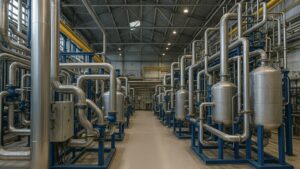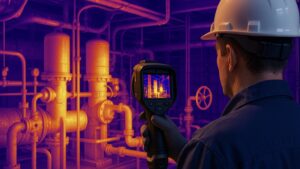Even the best-meaning businesses will still end up generating emissions through the simple act of transportation. People need to get around, logistics have to keep operating and we have to drive from time to time. Despite many recent advancements, electric vehicles (EVs) are still the minority on the road. As the world decarbonizes, companies need to explore how to reduce the footprint caused by transportation and prepare for a future where the gas tank is replaced by battery capacity.
Why is it important?
Transportation is one of the largest sources of carbon emissions. According to the International Energy Agency (IEA), it accounts for roughly 24% of energy-related CO2 emissions, which makes it a good starting point for companies to address. A good substitution for fossil fuel-using vehicles are EVs, which have zero tailpipe emissions, making them much cleaner than gasoline or diesel-powered cars. Furthermore, the electricity used to charge the batteries can be generated from renewable sources, complementing the general switch to renewable energy.
Electric buses and trucks have even greater potential as they currently are major contributors to carbon emissions due to their high mileage and fuel consumption. Firstly, they produce less noise pollution and less harmful emissions, making them ideal for use in cities and urban areas. Secondly, they require less maintenance and have lower, overall operating costs. If the energy that powers the is produced sustainably, this can allow a company to switch its logistics to a fully net-zero alternative.
The costs and opportunities of Net Zero Transportation
Getting to a fully net-zero transportation system will require significant, persistent investment in electrical charging infrastructure, including charging stations and renewable energy generation and distribution. This last part is key, as unsustainably produced electricity will not help reduce CO2 levels by that much. However, the benefits of such a transition are crystal clear. It will not only reduce carbon emissions, noise, and air pollution but also create many new jobs in the building, installing, designing, and maintaining EVs and their associated infrastructure. New career paths will be created to fill these gaps, offering jobs across the world for both vehicles and energy generation.
What should companies keep in mind?
In conclusion, the adoption of electric cars, buses, and trucks is a crucial and realistic step toward achieving a net-zero transportation system. Currently, a lot of EVs and their associated infrastructure is still in its infancy, so companies need to keep track of developments. A good roadmap needs good information, so executives should explore existing technology and learn about current trends.
The Global Summit on Scope 3 Emissions Reduction will bring together key industry experts to learn more about reporting strategies & carbon data management in a small-scale, industry-driven event, on 20-21st April 2023 in Amsterdam, the Netherlands. The two-day, hybrid event features in-depth case studies of supply chain transformation, carbon accounting, and networking breaks dedicated to exchanging insights and expertise on tackling Scope 3 emissions. Visit future-bridge.eu and netzero-events.com or follow us on our social media to track other energy use and decarbonization events.





